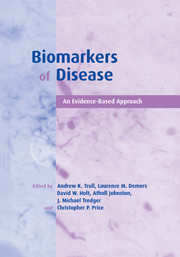Book contents
- Frontmatter
- Contents
- List of contributors
- Preface
- Part 1 Assessing and utilizing the diagnostic or prognostic power of biomarkers
- Part 2 Biomarkers of kidney disease and dysfunction
- Part 3 Biomarkers of bone disease and dysfunction
- Part 4 Biomarkers of liver disease and dysfunction
- Part 5 Biomarkers of gastrointestinal disease and dysfunction
- Part 6 Biomarkers in toxicology
- Part 7 Biomarkers of cardiovascular disease and dysfunction
- Part 8 Biomarkers of neurological disease and dysfunction
- Part 9 Biomarkers in transplantation
- 41 Monitoring heart and lung transplant patients
- 42 Monitoring liver transplant recipients
- 43 Chronic allograft damage index as a surrogate marker for chronic allograft rejection
- 44 Advances in pharmacodynamic biomarkers for monitoring the response to immunosuppressive drug therapy
- 45 The use of biomarkers for monitoring the response to immunosuppressive drug therapy
- 46 Post-transplantation bone disease
- 47 Molecular diagnosis of cytomegalovirus disease
- 48 Diagnosis and monitoring of inflammatory events in transplant recipients
- Index
48 - Diagnosis and monitoring of inflammatory events in transplant recipients
Published online by Cambridge University Press: 20 August 2009
- Frontmatter
- Contents
- List of contributors
- Preface
- Part 1 Assessing and utilizing the diagnostic or prognostic power of biomarkers
- Part 2 Biomarkers of kidney disease and dysfunction
- Part 3 Biomarkers of bone disease and dysfunction
- Part 4 Biomarkers of liver disease and dysfunction
- Part 5 Biomarkers of gastrointestinal disease and dysfunction
- Part 6 Biomarkers in toxicology
- Part 7 Biomarkers of cardiovascular disease and dysfunction
- Part 8 Biomarkers of neurological disease and dysfunction
- Part 9 Biomarkers in transplantation
- 41 Monitoring heart and lung transplant patients
- 42 Monitoring liver transplant recipients
- 43 Chronic allograft damage index as a surrogate marker for chronic allograft rejection
- 44 Advances in pharmacodynamic biomarkers for monitoring the response to immunosuppressive drug therapy
- 45 The use of biomarkers for monitoring the response to immunosuppressive drug therapy
- 46 Post-transplantation bone disease
- 47 Molecular diagnosis of cytomegalovirus disease
- 48 Diagnosis and monitoring of inflammatory events in transplant recipients
- Index
Summary
Introduction
The history and management of an intensive care patient suffering from systemic infection or sepsis or a patient who is in danger of becoming septic is totally different from that of a patient who will receive, or has received, a transplant. A patient who is registered on the waiting list for heart and/or lung transplantation has been chronically ill for months and even years. Patients waiting for a heart have circulatory and respiratory problems, multiple organ dysfunction and often show signs of immune depression. Lung transplant patients, however, have a long history of cystic fibrosis with all its associated infections, or have suffered from chronic bronchitis, emphysema or idiopathic fibrosis. All such patients have been under intensive medical care and observation and their underlying disease known and heavily and specifically treated. All transplant patients have to undergo major surgery with a long period of anaesthesia and extended trauma; they often receive multiple blood transfusions from foreign donors. After surgery, the patient experiences aggressive and chronic immunosuppression. Azathioprine, cyclosporin, tacrolimus and steroids are given within the first 7 days and remain at relatively high doses for another month. A rejection episode, which occurs in more than 60% of all transplant patients, needs an immediate boost of immunosuppression. Under this antirejection treatment, patients are at a significant risk of developing opportunistic infections.
- Type
- Chapter
- Information
- Biomarkers of DiseaseAn Evidence-Based Approach, pp. 474 - 482Publisher: Cambridge University PressPrint publication year: 2002



